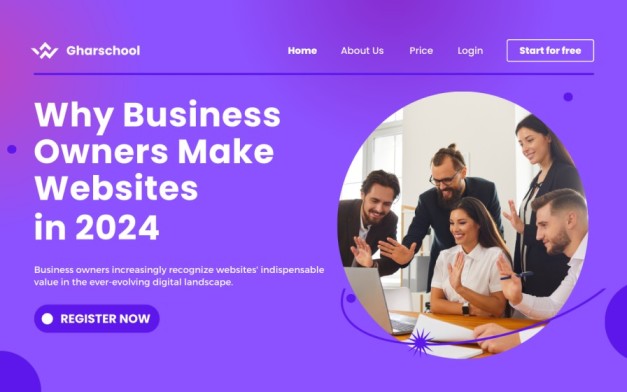Business owners increasingly recognize websites’ indispensable value in the ever-evolving digital landscape. As we advance into 2024, the role of a robust online presence becomes more critical than ever. This comprehensive article delves into the reasons behind this trend, describing why a website is essential for business success.
Enhancing Brand Visibility and Credibility
The Digital Shopfront
In 2024, a website serves as the digital shopfront for any business. Unlike a physical storefront, which is limited by location and operating hours, a website is accessible globally, 24/7. This constant availability not only enhances brand visibility but also bolsters credibility. Customers can find information about products and services at any time, building trust and reliability.
Key Points:
- 24/7 global accessibility
- Increased brand visibility
- Enhanced credibility and trust
Professional Image
A well-designed website reflects professionalism. In a market saturated with competitors, first impressions matter. A polished, user-friendly website can set a business apart, showcasing its commitment to quality and customer satisfaction. This is particularly crucial for small businesses and startups aiming to establish a foothold in the industry.
Key Points:
- Reflects professionalism
- Sets businesses apart
- Important for small businesses and startups
Driving Customer Engagement
Interactive Features
Modern websites are equipped with interactive features such as live chat, comment sections, and forums. These tools facilitate direct communication between the business and its customers, fostering a sense of community and engagement. Real-time interaction can significantly enhance customer experience and satisfaction, leading to higher retention rates.
Key Points:
- Live chat and forums
- Direct communication with customers
- Enhanced customer experience
Content Marketing
A website acts as a platform for content marketing, a powerful strategy for engaging customers. By regularly publishing blogs, articles, and videos, businesses can provide valuable information, answer common questions, and address pain points. High-quality content not only keeps the audience engaged but also improves search engine rankings, driving organic traffic.
Key Points:
- Regular publishing of blogs, articles, and videos
- Provides valuable information
- Improves search engine rankings
Expanding Market Reach
Global Accessibility
One of the most compelling reasons for having a website in 2024 is the ability to reach a global audience. The Internet transcends geographical boundaries, enabling businesses to market their products and services to potential customers worldwide. This expanded reach can lead to significant growth opportunities, especially for businesses in niche markets.
Key Points:
- Reach a global audience
- Transcend geographical boundaries
- Significant growth opportunities
E-commerce Integration
The rise of e-commerce has revolutionized the way businesses operate. Integrating e-commerce functionalities into a website allows businesses to sell products directly to consumers, bypassing traditional retail channels. This direct-to-consumer approach not only increases profit margins but also provides valuable insights into customer behavior through data analytics.
Key Points:
- Direct selling to consumers
- Increased profit margins
- Valuable customer insights
Cost-Effective Marketing
Digital Advertising
Compared to traditional advertising methods, digital advertising on platforms like Google, Facebook, and Instagram is more cost-effective and targeted. A website serves as the landing page for these ads, providing detailed information and encouraging conversions. By tracking metrics such as click-through rates and conversion rates, businesses can optimize their marketing strategies for better ROI.
Search Engine Optimization (SEO)
Investing in SEO is a crucial aspect of digital marketing. A well-optimized website appears higher in search engine results, increasing visibility and attracting more organic traffic. Effective SEO strategies include keyword research, quality content creation, and backlink building. These practices not only improve search rankings but also enhance the overall user experience.
Building Customer Trust and Loyalty
Transparency and Information
A website provides a platform for transparency. Businesses can share detailed information about their operations, mission, and values. This openness helps build trust with customers, who are increasingly seeking ethical and socially responsible brands. Additionally, providing comprehensive product information, including reviews and testimonials, can influence purchasing decisions and foster loyalty.
Personalized User Experience
Personalization is a key trend in 2024. Advanced technologies such as AI and machine learning enable businesses to offer personalized user experiences on their websites. By analyzing user behavior and preferences, businesses can tailor content, recommendations, and promotions to individual users, enhancing satisfaction and loyalty.
Staying Competitive
Industry Benchmarking
Having a website is no longer optional but a necessity to stay competitive. Businesses without an online presence risk being overshadowed by competitors who effectively leverage their websites. Regularly updating the website with new features, content, and functionalities can keep a business ahead of industry trends and benchmarks.
Customer Expectations
Modern customers expect businesses to have an online presence. A website meets these expectations by providing a convenient platform for accessing information, making purchases, and interacting with the brand. Failing to meet these expectations can result in lost opportunities and diminished brand perception.
Adapting to Technological Advances
Mobile Optimization
With the increasing use of smartphones, mobile optimization is crucial. A responsive website design ensures that the site functions seamlessly across various devices, providing a consistent user experience. Mobile-friendly websites not only improve user satisfaction but also rank higher in search engine results, as mobile optimization is a key factor in SEO.
Key Points:
- Essential for smartphone users
- Provides a consistent user experience
- Higher search engine rankings
Integration with Emerging Technologies
Emerging technologies such as virtual reality (VR), augmented reality (AR), and voice search are shaping the future of the internet. Businesses that integrate these technologies into their websites can offer innovative experiences, such as virtual product tours and AR-based try-ons. Staying abreast of technological advances ensures that a business remains relevant and appealing to tech-savvy consumers.
Conclusion
In conclusion, the importance of having a website for business owners in 2024 cannot be overstated. From enhancing brand visibility and credibility to driving customer engagement and expanding market reach, a website is a multifaceted tool that offers numerous benefits. By investing in a professional, optimized, and interactive website, businesses can stay competitive, meet customer expectations, and adapt to the ever-changing digital landscape.



